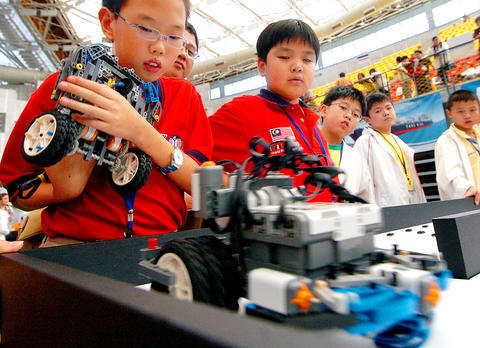More than 800 students and 170 teams from around the world are participating in the 2007 World Robot Olympiad in Taipei, an annual competition for young people in which competing teams assemble robots to perform tasks.
The competition, which is being held this weekend, is divided into two categories.
In the regular category, teams are required to assemble robots to solve a specific problem within an hour. The open category is a project-based, exhibition style competition in which the teams present robot designs.

PHOTO: LIAO CHEN-HUEI, TAIPEI TIMES
Teams in both categories are divided into three age groups: elementary school students, junior high school students and senior high school students.
The teams went into action yesterday on the floor of the National Taiwan University gymnasium with teachers, family members and friends watching in the stands.
The participants had to assemble robots with Lego bricks and controllers such as light, sound and temperature sensors.
The rules state the robots must accomplish assigned missions.
Topics for the competition were assigned by the Taiwanese organizers, who wanted to add local flavor to the event. For example, teams in the regular competition had to design robots that simulate the Alishan (
"Competitions like this help kids build their thinking skills, which is important for the future development of students who plan on entering engineering or related fields," said Kerry Bailey, an information technology consultant who works for the Abu Dhabi Education Council in the United Arab Emirates.
The competition helps the participants develop various skills, such as problem-solving and teamwork, Bailey said, adding that the event exposes kids to an innovative environment.
The World Robot Olympiad was established in 2004 by a committee made up of experts from universities around the world with the aim of promoting innovation and education.

Taiwan is stepping up plans to create self-sufficient supply chains for combat drones and increase foreign orders from the US to counter China’s numerical superiority, a defense official said on Saturday. Commenting on condition of anonymity, the official said the nation’s armed forces are in agreement with US Admiral Samuel Paparo’s assessment that Taiwan’s military must be prepared to turn the nation’s waters into a “hellscape” for the Chinese People’s Liberation Army (PLA). Paparo, the commander of the US Indo-Pacific Command, reiterated the concept during a Congressional hearing in Washington on Wednesday. He first coined the term in a security conference last

Prosecutors today declined to say who was questioned regarding alleged forgery on petitions to recall Democratic Progressive Party (DPP) legislators, after Chinese-language media earlier reported that members of the Chinese Nationalist Party (KMT) Youth League were brought in for questioning. The Ministry of Justice Investigation Bureau confirmed that two people had been questioned, but did not disclose any further information about the ongoing investigation. KMT Youth League members Lee Hsiao-liang (李孝亮) and Liu Szu-yin (劉思吟) — who are leading the effort to recall DPP caucus chief executive Rosalia Wu (吳思瑤) and Legislator Wu Pei-yi (吳沛憶) — both posted on Facebook saying: “I

The Ministry of Economic Affairs has fined Taobao NT$1.2 million (US$36,912) for advertisements that exceed its approved business scope, requiring the Chinese e-commerce platform to make corrections in the first half of this year or its license may be revoked. Lawmakers have called for stricter enforcement of Chinese e-commerce platforms and measures to prevent China from laundering its goods through Taiwan in response to US President Donald Trump’s heavy tariffs on China. The Legislative Yuan’s Finance Committee met today to discuss policies to prevent China from dumping goods in Taiwan, inviting government agencies to report. Democratic Progressive Party Legislator Kuo Kuo-wen (郭國文) said

The Ministry of Economic Affairs has fined Taobao NT$1.2 million (US$36,900) for advertisements that exceeded its approved business scope and ordered the Chinese e-commerce platform to make corrections in the first half of this year or its license would be revoked. Lawmakers have called for stricter supervision of Chinese e-commerce platforms and more stringent measures to prevent China from laundering its goods through Taiwan as US President Donald Trump’s administration cracks down on origin laundering. The legislature’s Finance Committee yesterday met to discuss policies to prevent China from dumping goods in Taiwan, inviting government agencies to report on the matter. Democratic Progressive Party